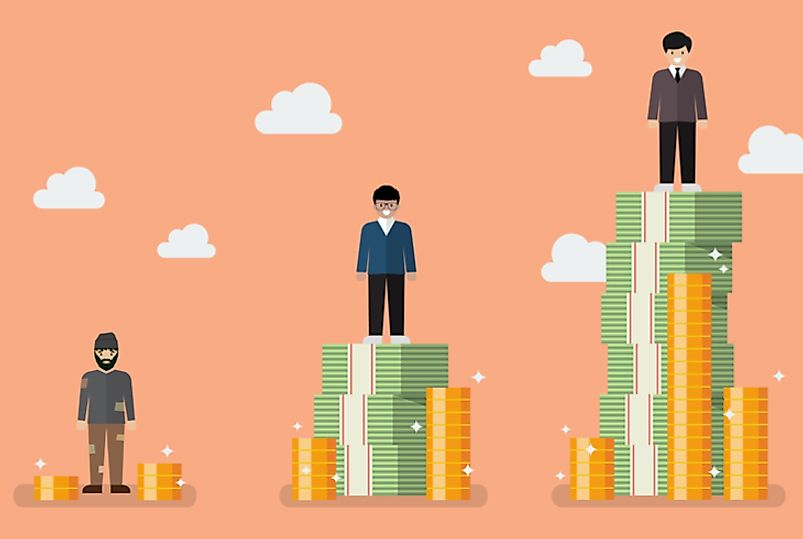What is Economic Determinism?

Sociologists, especially in Europe, had the thought that people classes and differentiation were the foundation of economic influences. The approach claimed the greatest reputation in Europe and continued to exert influence until the 1980s. However, the theory did not create much influence in other parts of the world.
What is Economic Determinism?
Economic determinism is a theory which states that financial status is the basis at which all other societal arrangements such as political and social arrangements are determined. The theory emphasizes that all societies are subdivided into economic classes that are competing to control the political system. The ruling class utilizes its economic power to exert political supremacy. In Karl Marx’s version, Marx pays attention to the proletariat who are fighting with capitalists over the governing system of the society. He believed that the struggle would only end through a revolution that will overthrow the capitalism and install the system of socialism in which resources are controlled by the states establishing a classless society.
What Does Economic Determinism Have in Common with Marxist Philosophy?
Marxism also believe in class struggles as the basis of social development. Marxism is a methodology that advocates for the struggling class, the proletariat against capitalists, unlike the economic determinism that allows those who are economically empowered to use their financial status to establish political rule over the working class. Marxists emphasized the equality among the members of society in which all resources are controlled by the state, excluding the use of economic strength to gain political advantage over others as advocated by the of economic theory determinism. “Vulgar Marxism” has been a term used by Marxists to describe economic determinism. The term was used in consideration that economic infrastructure did not determine the political supremacy, and thus those who were against Marxism chose to believe in economic determinism as a scapegoat to rule others.
Although Marxism and economic determinism differ, they do have similarities in some areas. Therefore, to understand the relationship, we will look at the parts of the industrial process they shared.
To understand the economic determinism relation with the Marxism, it is important to point out that the theory itself is attributed to Karl Marx, the philosopher who came up with Marxism. Marxism and economic determinism both shared the historical materialism, means of production, and production mode.
Historical materialism refers to a belief that you cannot comprehend the past by only concentrating on its religion, people, wars, legal traditions, and politics but also by appreciating that the history has been shaped by the material changes over a long time. The changes were occasioned by the competition between the rulers (the rich) and the citizens (people under the economy oppression).
Marx did elevate the economy as the primary factor that determined the civilization to understand what he called the “History Economic Theory.” Thus, he framed the meaning of economic determinism on the basis that society took a particular direction and was shaped by the definitive economy systems and the inter-relationships in place. Marx stressed that economy did not have influence only on the place of work but also on family law, religion, and any other part of life at any given time.
What are Modes of Production?
Over a long time, various economic structures have come into existence. These different economic structures are what Marx referred to as the “modes of production”. The uniting factor among the multiple systems was that all of them have a group of people who had control over them. The team solidified various positions in power by exercising control over the means of production, for example, technology and infrastructure that produced raw materials needed for survival. The ruling group owned raw materials, machines, and land as a way of ensuring enough accumulation of wealth. Marx stated that this practice is the sole reason why there is poverty in the society.
Another mode of production is capitalism which was common during the era of Marx. Capitalism is an economic structure in which the private business owners run the industries under their control to generate profits and retained market in a largely perceived free market. Marx believed that capitalism only benefited the business owners, a group he called capitalists at the detrimental of the workers who he referred them as proletarian.
Marx thought that capitalism came into existence in recent years following other modes of production such as feudalism and slavery. According to him the presence of poverty in the community was occasioned by the capitalism and Marx believed that just like slavery and feudalism, capitalism would die off. The capitalists and the labor providers called the proletariat (lower class) engaged in a struggle to out-compete the other. In one of his pieces of work, Marx claimed that proletariat would, at last, emerge the winner through the establishment of a classless society.
What Was the Argument Against Economic Determinism?
Marxism was criticized for lowering the development of history and community to economic determinants only. Many have argued that the economic factor is not the only important element and have suggested they play secondary roles among other factors in the development of the society. Scholars that did not support Marxism have objected the economic determinism describing it as an exaggeratedly generalized theory and stressed that as far as rational historical justification is concerned, economic actualities must at all times refer to non-economic realism.
What is the Myth of Economic Determinism?
According to some scholars, Marx’s thought on economic determinism is a myth. They used Marx’s statement that men shape their history under the guidance of the circumstances dictated by what had happened in the past. To those scholars, the statement suggested that there is a an already constituted social system in the world that restricts the way in which we shaped our history.











